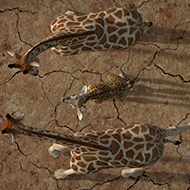
Collaboration to bolster wildlife monitoring strategies
A joint team from the University of Bristol and the Bristol Zoological Society (BZS) are working to develop a new approach to wildlife monitoring and conservation, using machine-learning and drone technology.
In December of last year, a joint team flew to Bénoué National Park in Cameroon, to trial the use of drones and sensor technologies to monitor the critically endangered Kordofan giraffe. The area is approximately 1,600km2 and much of it is practically inaccessible on foot, presenting a increased challenge for wildlife monitoring.
“There has been a significant and drastic decline recently of larger mammals in the park and it is vital that accurate measurements of populations can be established to guide our conservation actions,” said Dr Gráinne McCabe, head of field conservation and science at Bristol Zoological Society.
The team approached Dr Matt Watson from the University of Bristol’s School of Earth Sciences, and Dr Tom Richardson, senior lecturer in flight mechanics and member of the Bristol Robotics Laboratory (BRL), for assistance in devising the best strategy for airborne wildlife monitoring.
Dr Richardson said: “It is likely that we will need more than one type of drone, and several different sensors to allow us to operate 24 hours a day and throughout the year. Modern multispectral cameras combined with machine learning and high-performance vehicles will need to be fully automated to cover an area of this size. Combine that with remote, constrained field operations and we have an interesting set of engineering problems to tackle.”
Teams from across these sectors are now working to create a large-scale proposal to develop the technologies necessary for tackling this challenge. They plan to return to Cameroon in early 2021.
Dr Watson added: “A machine learning based system that we develop for the Kordofan giraffe will be applicable to a range of large mammals. Combine that with low-cost aircraft systems capable of automated deployment without the need for large open spaces to launch and land, and we will be able to make a real difference to conservation projects worldwide.”



 The latest
The latest